Posts Tagged ‘Category Design’
055 How To Fight Injustice w/ Legendary Marketing | Marketing PodStorm 17
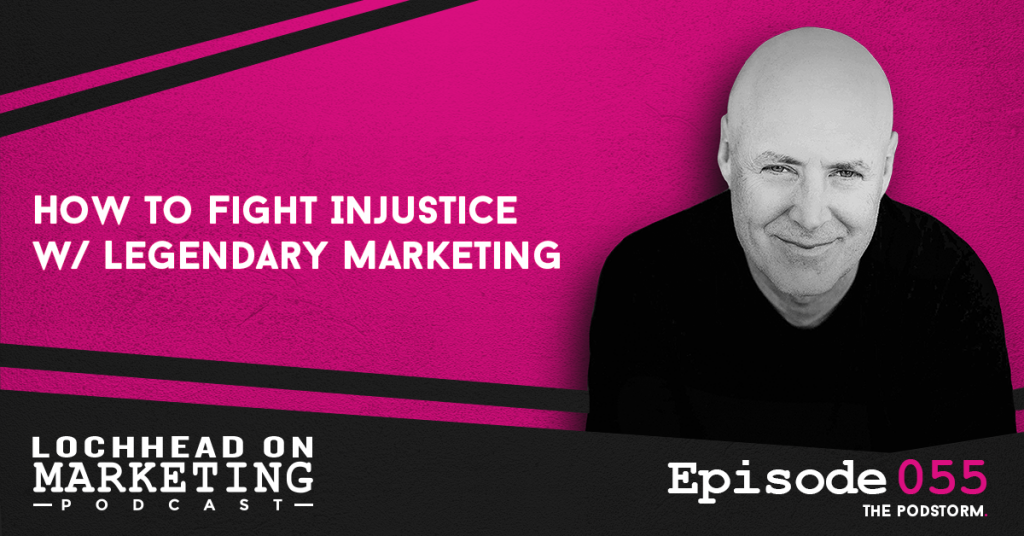
Podcast (lochheadonmarketing): Play in new window | Download (Duration: 14:08 — 9.7MB) | Embed
Subscribe: Apple Podcasts | Spotify | RSS | More
Today, let’s take a look at the role of marketing in driving real, dramatic, impactful, important social change. We dig into topics like the battle against AIDS, the women’s movement, and even the founding of the United States of America as actual acts of legendary marketing, and what you might think of as category design.
It moves the world
Christopher believes that legendary marketing does more than just drive sales. Legendary marketing does more. Marketing a provocative point of view creates a new category of social fabric that drives real societal change
“I would argue to you that the greatest marketers, the most legendary marketers are actually category designers. They introduced the world to new ways of thinking, playing, and working and for major societal change to happen. It requires new categories of thinking, what you might think of as very different points of view, points of view that move the world from the way it is today, to the way we want it to be.” – Christopher Lochhead
More on Societal Change
From spreading awareness about AIDS, to equality wage for equal work, to the establishment of the United States of America, Christopher carefully breaks down why these are provocative points of view that later on demanded societal changes.
He reads several quotes lifted from the actual Declaration of Independence and touches on self-governance, which is timely at the moment of recording, where there is civil unrest in the US because of the untimely death of African American George Floyd.
Designing The World of Your Choosing
As Christopher believes this is a cocoon time, a time in between pre-Covid19 and post Covid19, he poses a question on what kind of world we would like to design?
“So what am I saying to you? Whether it’s a legendary entrepreneur, artist, or social change agent? The question facing all of us in the United States, particularly and frankly, around the world, is what kind of country and what kind of world do we want to design now?” – Christopher Lochhead
Ultimately, for exponential change to happen, it requires category design. It requires the marketing of a point of view that mobilizes a movement to take the world to an exponentially different future. This is why Christopher thinks a real social change requires category design and legendary marketing predicated on a powerful and different point of view.
Bio:
Christopher Lochhead is a #1 Apple podcaster and #1 Amazon bestselling co-author of books: Niche Down and Play Bigger.
He has been an advisor to over 50 venture-backed startups; a former three-time Silicon Valley public company CMO and an entrepreneur.
Furthermore, he has been called “one of the best minds in marketing” by The Marketing Journal, a “Human Exclamation Point” by Fast Company, a “quasar” by NBA legend Bill Walton and “off-putting to some” by The Economist.
In addition, he served as a chief marketing officer of software juggernaut Mercury Interactive. Hewlett-Packard acquired the company in 2006, for $4.5 billion.
He also co-founded the marketing consulting firm LOCHHEAD; was the founding CMO of Internet consulting firm Scient, and served as head of marketing at the CRM software firm Vantive.
Links:
African Americans are incarcerated more than 5 times the rate of white people
From Kenneth Cole, a New Solidarity
We hope you enjoyed this episode of Lochhead on Marketing™! Christopher loves hearing from his listeners. Feel free to email him, connect on Facebook, Twitter, Instagram, and subscribe on iTunes! You may also subscribe to his newsletter, The Difference, for some amazing content.
050 How to Discover a New Category| Marketing PodStorm #12
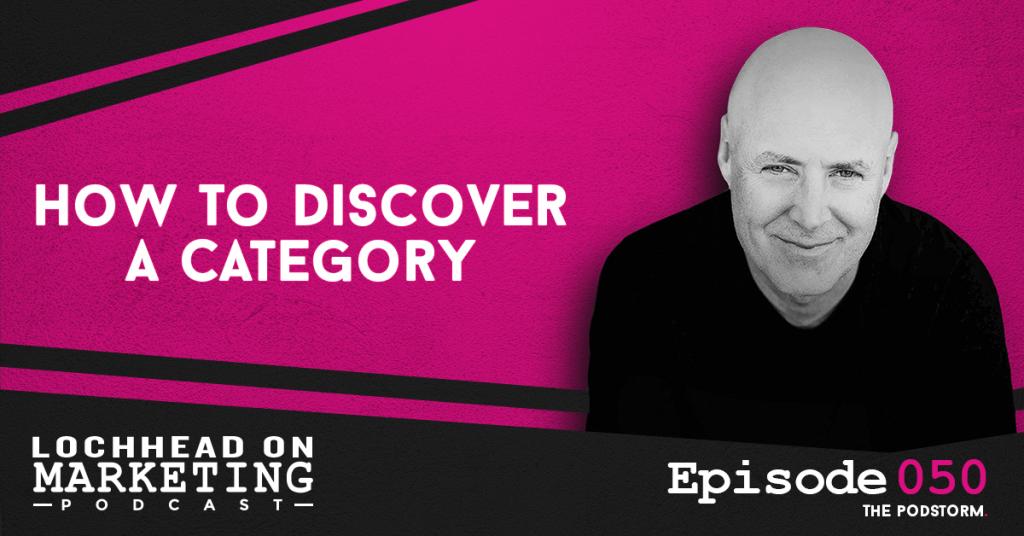
Podcast (lochheadonmarketing): Play in new window | Download (Duration: 8:29 — 5.8MB) | Embed
Subscribe: Apple Podcasts | Spotify | RSS | More
In this episode of the PodStorm. let’s talk about how to discover a category, create massive differentiation, and build a super valuable company, particularly in challenging times.
Designed, Not Discovered
Christopher gets all sorts of questions such as “how do I know if I have a category?” “I think I might have something, how do I discover a category?” “How do I know if this is a new category?” “How do I redesign an existing category, etc.” The first thing Christopher shares to us is: categories are not discovered.
“They are created, they are designed and legendary entrepreneurs, legendary marketers, legendary innovators, teach the world how to see things the way they do. And so that category is not discovered like a new piece of land. It’s created, you’re bringing something new forward.” – Christopher Lochhead
Future of Our Choosing
Christopher points out that designing a market category is like choosing the future. Legendary marketers are like visitors from the future, moving the market into a certain point of view they choose, in order to solve a certain problem,
“The first thing I’d point you to, is, what is it the insight that you’re differentiating on? What’s what we call missing in the market category that you see? And sometimes that missing is giant, we discover some kind of plutonium of sorts.” – Christopher Lochhead
Technical and Market Insights
In the book Play Bigger, Christopher wrote about his learnings from Anne Miura-ko, Co-founder of Floodgate Capital. He gives out examples to identify and differentiate the types of insights.
“What Anne says essentially is that there are two kinds of insight: there’s a market insight where you see a missing in a market and there’s a technical or innovation insight.” – Christopher Lochhead
After identifying what kind of insight you have, Christopher advises that you must be able to explain the problem you are solving to a three-year-old.
“Because clarity of focus, clarity of thinking, clarity of language, is critical if you’re going to do pretty much anything legendary.” — Christopher Lochhead
To know more about how to discover and design a category, download and listen to this episode.
Bio:
Christopher Lochhead is a #1 Apple podcaster and #1 Amazon bestselling co-author of books: Niche Down and Play Bigger.
He has been an advisor to over 50 venture-backed startups; a former three-time Silicon Valley public company CMO and an entrepreneur.
Furthermore, he has been called “one of the best minds in marketing” by The Marketing Journal, a “Human Exclamation Point” by Fast Company, a “quasar” by NBA legend Bill Walton and “off-putting to some” by The Economist.
In addition, he served as a chief marketing officer of software juggernaut Mercury Interactive. Hewlett-Packard acquired the company in 2006, for $4.5 billion.
He also co-founded the marketing consulting firm LOCHHEAD; was the founding CMO of Internet consulting firm Scient, and served as head of marketing at the CRM software firm Vantive.
We hope you enjoyed this episode of Lochhead on Marketing™! Christopher loves hearing from his listeners. Feel free to email him, connect on Facebook, Twitter, Instagram, and subscribe on iTunes! You may also subscribe to his newsletter, The Difference, for some amazing content.
135 Restoring the Soul of Business w/ Rishad Tobaccowala
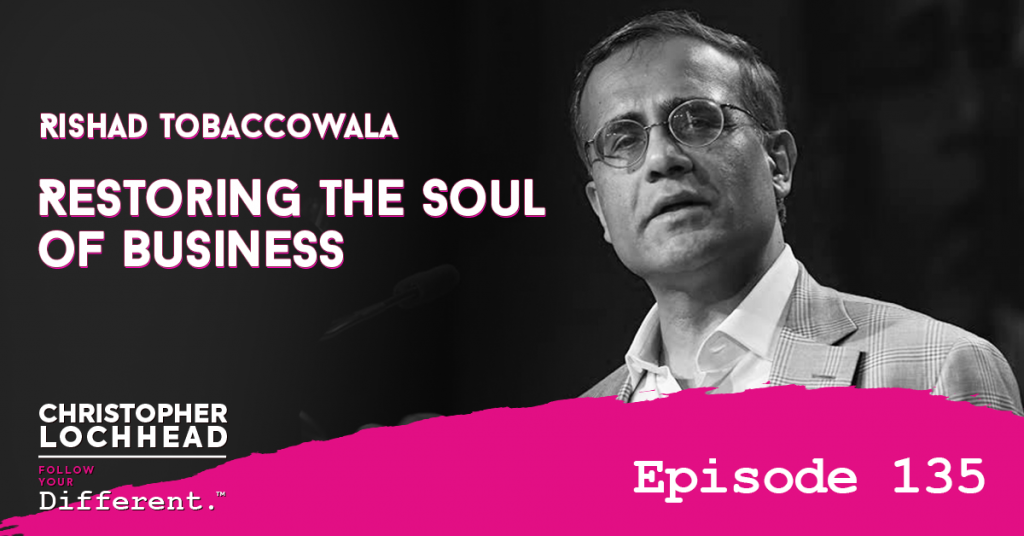
Podcast: Play in new window | Download (Duration: 51:39 — 71.3MB) | Embed
Subscribe: Apple Podcasts | Spotify | Pandora | RSS | More
Today, we feature another great author in this series. Rishad Tobaccowala is the Chief Growth Officer at Publicis Groupe, an advertising and communications firm with 80,000 people! He has a brand new book, Restoring the Soul of Business.
We talk about how business leaders are overly focused on spreadsheets, why the best companies are like religions, the importance of being human beings at work!
Spreadsheet, Story, and Soul
Over the last few years where things are moving extremely fast because of technology, data, financial and twitchiness of time, Rishad shares that companies have started tilting towards the spreadsheet side of the business, which is measurable, data-driven and financial.
However, for Rishad, a successful company is one who can marry both the spreadsheet side of the business and the story of the business, which is about the culture, the purpose, values, emotion, and talent of the company.
“The soul of the business is when you combine the story and the spreadsheet in a way that you have a viable growing business with viable growing people, in a community that is also viable.” – Rishad Tobaccowala
Business Is For Citizens
Rishad believes that its time to optimize the business for the citizen, and not for the consumer. He discussed about this during his talk last January 2019, addressing professionals from Apple, Amazon, Google and Facebook.
“What we’ve created is something incredible in both the empowerment, the connections, and the wealth creation opportunities. At the same stage, there is a downside, which is, increased inequality, increased polarization and to a great extent, a break down of trust. Could it be, that in chasing just the data side of the spreadsheet side, we lost the souls of our businesses?” – Rishad Tobaccowala
The Purpose of A Company
The first one is to ensure that its four constituencies are looked after. The four are
(1) people who they serve – customers, members, users, consumers
(2) the talent that works in the company
(3) community in which the company or the companies offices and factories are based and
(4) the country in which that particular segment of the company is based.
Rishad shares that the 2nd part of the company’s reason to be.
”To generate financial profit which basically allows the company to both reinvest in all those first four criteria, as well as continue to grow because to me, growth is an important thing, but growth measured across those four indicators.” – Rishad Tobaccowala
The third one is how companies create purpose, value, meaning, and connections for life.
To listen more about Rishad’s advice to restore the soul in the business, download and listen to this episode.
Bio:
Rishad is Chief Growth Officer and member of the Management Committee of Publicis Groupe, the world’s third largest communication firm with 80,000 employees.
BusinessWeek named Rishad as one of the top business leaders for his pioneering innovation and TIME magazine dubbed him one of five “Marketing Innovators.
Rishad’s first book “Restoring the Soul of Business: Staying Human in the Age of Data” will be published globally on January 28, 2020.
Re-Inventing blog features some of his writings.
Prior to his current role, Rishad was the Chief Strategist and Member of the Directoire/+ of Publicis Groupe.
Before his corporate role, Rishad was the Chairman of DigitasLBi and Razorfish. Publicis Groupe owns these two global firms, with over 10,000 employees around the world focused on marketing and business transformation.
Rishad has 36 years of experience around the world and helped grow, founded/co-founded or incubated a variety of companies including VivaKi, Leo Burnett, Starcom, SMG Next, Starcom IP, Giant Step, Play, and Denuo.
Rishad has a BS in Mathematics from the University of Bombay and an MBA in Marketing and Finance from the Booth School of Business at the University of Chicago.
Links:
Book: Restoring the Soul of Business: Staying Human in the Age of Data
We hope you enjoyed this episode of Follow Your Different™! Christopher loves hearing from his listeners. Feel free to email him, connect on Facebook, Twitter, Instagram and subscribe on iTunes!
027 How To Create a New Category & Brand w/ Carrie Palin, CMO of $20B Splunk
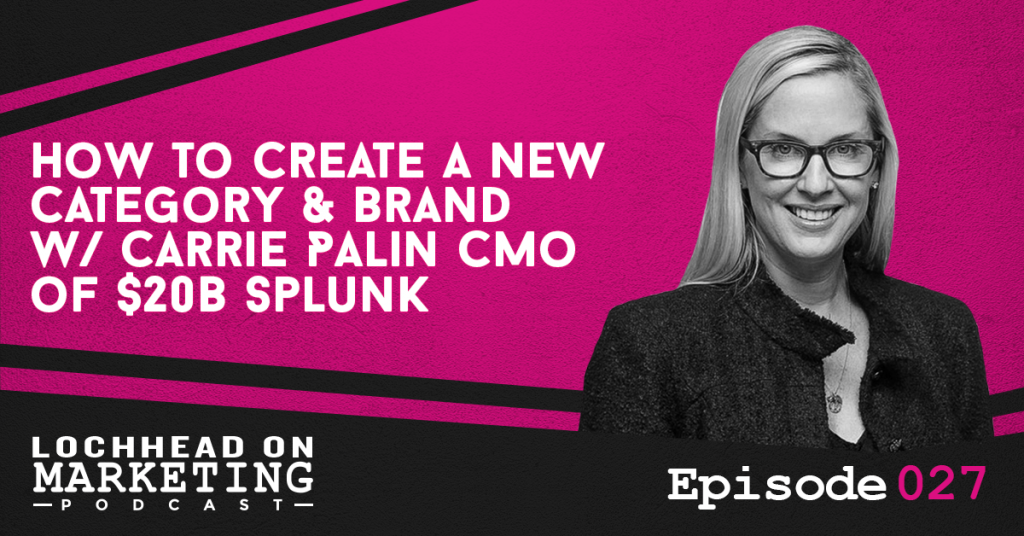
Podcast (lochheadonmarketing): Play in new window | Download (Duration: 25:10 — 34.6MB) | Embed
Subscribe: Apple Podcasts | Spotify | RSS | More
This special episode of Lochhead on Marketing is the actual conversation of Christopher Lochhead and Carrie Palin, CMO of software company Splunk, during their appearance at Hypergrowth San Francisco.
Carrie shares how she spearheaded the category creation of Data to Everything and brand re-launch of Splunk.
Splunk at Hypergrowth
Christopher Lochhead and Splunk CMO Carrie Palin were invited to speak at Hypergrowth San Francisco to talk about creating a new category and brand. Drift organized this awesome business and marketing conference. This conversation is a rare opportunity to go behind the scenes of a very successful, super high-growth company like Splunk.
“At Splunk, we’re very proud of our culture. We’re very proud of our history. There’s something we call Splunkiness.” – Carrie Palin
Splunk is a publicly-traded software company worth $20B and they have recently launched a new category called Data to Everything. They have also relaunched their brand, changing their logo from green and black to orange and pink.
Rough Start
Carrie shared that her forte is in demand generation and she found category creation and branding to be quite challenging. She notes that aside from having a great branding team, she had great bosses who believed in her vision.
It was a rough start for Carrie, as three days into her new role, she received a piece of unfortunate news about her ailing father. It was one of the challenging events of her life but she acknowledged that Splunk CEO and President had been supportive of her grief.
“Splunk stuck with me. They treated me like I’ve been there 20 years versus 3 days. Four months after that, it was crazier than I ever anticipated. Now that was through that, I know that it was absolutely the right place for me to be.” – Carrie Palin
On-boarding the BOD
Carrie shared amazing stories on how she on-boarded the Board of Directors with her ideas. She gave a lot of weight on conviction and commitment to the Board.
“Listen to your data. Turn your data into doing, which is exactly what our clients are doing. They’re doing really incredible things.” – Carrie Palin
To hear more about How To Create a New Category & Brand w/ Carrie Palin, CMO of $20B Splunk, download and listen to the episode.
Bio:
Carrie Palin has been Splunk’s Senior Vice President, Chief Marketing Officer since 2019.
Prior, Ms. Palin served as the Chief Marketing Officer at SendGrid, a digital communications platform company acquired by Twilio, from 2018 to 2019.
From 2016 to 2018, Ms. Palin served as the first Chief Marketing Officer and Senior Vice President at Box, a cloud content management company.
Ms. Palin served as the Vice President of Marketing for IBM’s Cloud Data Services and Analytics Software Division from 2015 to 2016.
She also previously spent over 15 years at Dell leading various marketing organizations. Ms. Palin holds a B.S. Communications degree from Texas Christian University.
Links:
We hope you enjoyed this episode of Lochhead on Marketing™! Christopher loves hearing from his listeners. Feel free to email him, connect on Facebook, Twitter, Instagram and subscribe on iTunes! You may also subscribe to his newsletter, The Difference, for some amazing content.
025 Category Creation & Category Design: A New Lens On Business
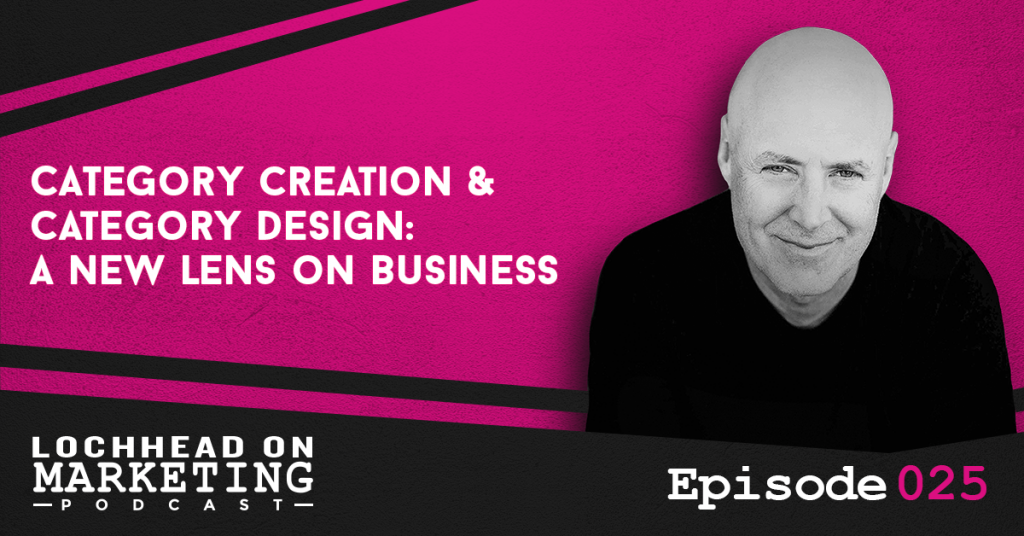
Podcast (lochheadonmarketing): Play in new window | Download (Duration: 19:55 — 27.5MB) | Embed
Subscribe: Apple Podcasts | Spotify | RSS | More
In this episode, Christopher Lochhead takes listeners on an exercise in developing their eye for category creation and category design. Category Design is a new level of thinking in business. It is a whole different approach to marketing and Christopher stresses its importance in building a legendary business.
See Things Differently
Kevin Mainey wrote in the book Play Bigger, that “category design is a new lens on business. Once you have that lens, you see things in a very unique way.” However, listeners often ask Christopher how can they specifically apply these to their businesses.
In this episode, Christopher uses a recent story in the WSJ as an example of how category design is powerful force, that most people don’t know is there. He breaks down a recent story about Google buying FitBit, with the hopes of assisting listeners on how to develop their eyes and ears on category design lens.
Google Buys Fitbit: A Category Design Example
Headline:
Google to Buy Fitbit, Amping Up Wearables Race
By Rob Copeland and Patrick Thomas
Updated Nov. 1, 2019
Sub-head:
Deal to acquire maker of wearable fitness products for $2.1 billion extends Google’s reach in consumer electronics
Wearables is a niche in the consumer electronics mega category.
Google reached a deal to buy wearable fitness products company Fitbit Inc. FIT 15.53% for roughly $2.1 billion, a move that intensifies the battle among technology giants to capture consumers through devices other than smartphones.
Category name before company name, its an example of the fact that people need to know what it is, before knowing who it is. The second sentence is framing the category battle.
For Google, the deal marks a further push into health. as it faces regulatory threats to its massive internet-search and advertising business.
Underscoring Google moving into mega category of health tech, then stating Google’s category king positing in search.
It also puts Google in renewed and direct competition with Silicon Valley neighbor Apple Inc., which in the past week said rising sales of wearables and related services were becoming a bigger driver of its business.
Framing the competition in new wearables category and wearables category growth.
Google’s parent Alphabet Inc. will spend just a sliver of its $121 billion cash hoard to branch out with Fitbit’s products. Alphabet’s $2.1 billion bid was for $7.35 a share in cash, a 19% premium to Fitbit’s closing price Thursday and more than 70% above where the stock was trading last week before deal talks were first reported by Reuters.
Speaks to the premium price category queens get in M&A.
Fitbit shares rose more than 15% to $7.14 on Friday, while Alphabet’s shares ticked up slightly.
The deal lands at a moment when Google and other tech giants are under scrutiny on a number of fronts over their competitive practices and dominance of certain businesses,
“certain businesses” means categories. This points to the domination category queens achieve.
including through acquisitions. But the Mountain View, Calif., company continues to expand aggressively.
Translation: moves into new categories through internal efforts and M&A.
Founded in 2007, Fitbit makes so-called wearables, or watches and bracelets that primarily track health information like heart rate. Such products have fascinated Silicon Valley
Speaks to early adopters embracing the category.
where technology executives of all ages proudly wear rings and other devices to track sleep and “hack” their own personal performance.
Wearables (category name) have proved far less popular with the broader public. Google several years ago launched a brand of smart glasses that attracted as much ridicule as buyers, and Snap Inc. likewise got a lukewarm response to its hyped Spectacles line.
Speaks to the trouble the “wearables” category have had breaking past early adopters to hit a main-stream tipping point. This is normal in the early days of a category. Also note, categories will NOT tip until a category queen emerges. Mainstream buyers want a safe option. AND they do NOT want to compare. They want to buy.
Fitbit traded for $45 soon after it went public in 2015, but the stock has cratered in the past few years as the company ceded market share to Apple and its smartwatch.
Speaks to the category battle with Apple
With its fitness offerings, Fitbit collects myriad and personal data on users that it in turn uses to suggest exercises and other lifestyle changes. And its sale is bound to raise issues around consumer privacy. In announcing the acquisition, Google said it wouldn’t use Fitbit data to help power its massive online advertising business.
Speaks to data as a seminal driver of category flywheels
“Similar to our other products, with wearables, we will be transparent about the data we collect and why,” Rick Osterloh, the head of Google’s hardware division, said in a statement. ”We will never sell personal information to anyone. Fitbit health and wellness data will not be used for Google ads. And we will give Fitbit users the choice to review, move, or delete their data.”
Apple in many ways is a model for what Google hopes to accomplish.
While the Apple Watch was initially a disappointment, sales have picked up lately; and the company’s AirPods were an immediate hit. The iPhone maker said on Wednesday that sales in its wearable business (category name) soared 54% in the latest quarter.
Facebook is also in the wearables mix. This fall the social-media giant reached a deal to buy CTRL-Labs Inc., a startup that develops devices that can interface with the brain.
“We’re talking about data that used to be impossible to collect on a mass scale,” Craig Hallum analyst Alex Fuhrman said. “Only since the beginning of the Fitbit era (new category pioneered by FitBit) have consumers been walking around with wearables that monitor their heart nearly 24 hours a day.”
Google’s hardware line (category) for now consists mostly of slow-selling products like the Chromebook laptop and Pixel smartphone.
Google has spent billions on targets like HTC Corp. , a smartphone maker, and Nest, a home hardware company, with little to show for it in sales, analysts say. Google doesn’t break out financial performance for its hardware division.
It hired Mr. Osterloh, a former Motorola president, in 2016 to steer the nascent unit. In an interview with The Wall Street Journal last month, Mr. Osterloh often referred to the hardware division as a “startup” within the conglomerate.
“I think eventually this will be a very large, important business,” he said.
Some observers remain skeptical. “The acquisition is another example of Google tilting at windmills” in hardware, analysts at Wedbush Securities wrote in a report Friday. “Google is uniformly bad at consumer products in our view, and appears to us to be intent on spending whatever it takes to prove our view wrong.”
Fitbit says it has sold more than 100 million devices world-wide since its founding, and currently has more than 28 million active users.
“Google is an ideal partner to advance our mission” said James Park, a Harvard University dropout who co-founded Fitbit.
Category creators tend to self-identify as mission driven
“With Google’s resources and global platform, Fitbit will be able to accelerate innovation in the wearables category, scale faster, and make health even more accessible to everyone,” he said in a statement.
The deal is expected to close next year, the companies said.
Fitbit’s results have been pressured in recent months. In July, it lowered its full-year revenue outlook after weaker-than-expected sales of its new smartwatch model, Versa Lite.
The smartwatches (sub-category name of wearbles category) are aimed at competing with popular offerings from Apple and Samsung Electronics Co.
Still, the company reported narrower losses in the second quarter as sales of its fitness trackers jumped 51% and the health division showed some strength. Fitbit is scheduled to release its third-quarter earnings report Nov. 6.
—Sarah E. Needleman contributed to this article.
***
So whats the point?
Here’s an article, that most people in business would read as, one company buying another company. In a marketing perspective, it underscores the fact that Google is buying the leading position in a hot new growth category.
“They’re not just buying FitBit or its products or its customers or its technology. They’re buying a position in a category, just like what they did, for example, when they bought Youtube.” – Christopher Lochhead
Christopher hopes that this exercise helped you understand category lens a little bit better.
“I would urge you in your next business discussion and the next arti8cle you read in the Wall Street Journal, or whatever else you read, start to think about these things from a category perspective. How they’re talking about, often is really a description of a larger set of dynamics happening over all in the marketplace.” – Christopher Lochhead
Bio:
Links:
122 Legendary Lighting & Nightclub Designer Steve Lieberman
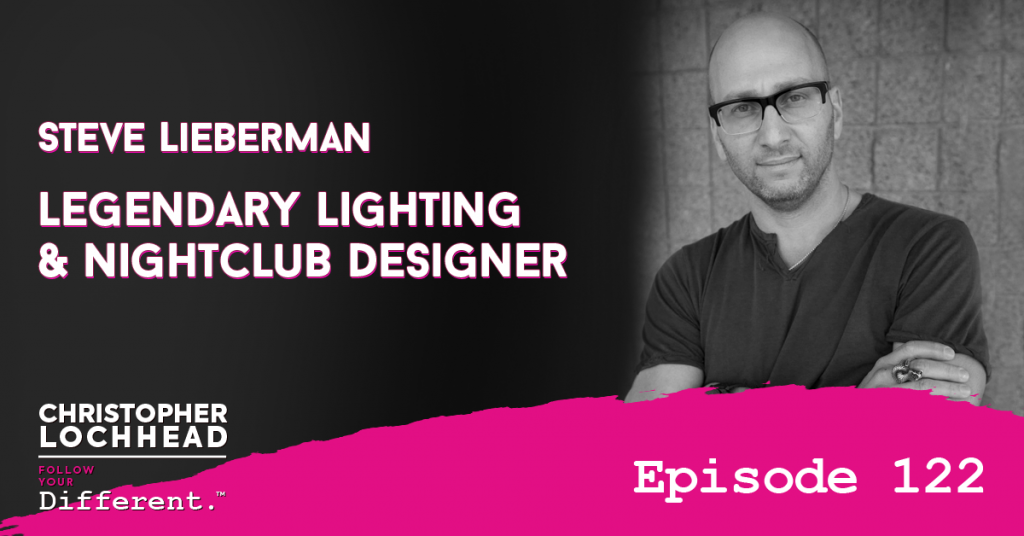
Podcast: Play in new window | Download (Duration: 57:55 — 79.5MB) | Embed
Subscribe: Apple Podcasts | Spotify | Pandora | RSS | More
Today, entrepreneur and the incredibly creative guy Steve Lieberman, Founder & CEO of SJ Lighting, joins us today for another riveting conversation. Steve and his team have had a hand in almost every nightclub and electronic music festival in the US for the last ten years. He shares how he creates a lasting impact on attendees and how the whole production process goes, from planning to execution.
Monumental Impact
Even at a young age, he shares how he finds big, monumental art pieces as impactful. He carried on this astonishment for impactful art as he pursued a career in events production, specifically focusing on lights.
“Whether it’s a big show or a little show, its 100,000 or 300-people-intimate-club-show, we like impact. An audience is coming to some show, they want to be moved. They want to be stimulated.” – Steve Lieberman
Steve Lieberman has worked with more than 50 clubs and major festival brands like Electric Daisy Carnival, Coachella, Ultra, Lollapalooza, Rolling Loud and many more.
Similar Philosophies
Steve shares how he and his colleagues share the same philosophies when it comes to event production. He further describes the whole lighting experience as “fluid with the music” as it is a visual representation of what the music is.
“When an audience comes in there, we have their attention and we want to give them something that they’re gonna live with. I want them to leave that show and have something specific. It doesn’t need to be ten things. Whether it’s visual, oral—something that they heard—just part of their experience that they’re going to take with them and they’re going to keep that forever.” – Steve Lieberman
Puzzle Pieces
Steve describes how every show is a little bit different. He says that there is no linear path from a to b. As a designer, it’s not just taking out a worksheet and figuring out math problems. He sees production as fitting different pieces of a puzzle.
The design, procedures, modify based on what’s required and is highly dependent on the scale of the show. He shares he has to absorb all the information of what the show is, what the performers might prefer and who are the headlining artists.
“I’d like to think, the promoters and basically, the guys who write the checks for the show, we’re on the same team. At the end of the day, my contracts are 99.9% with them. My priority is to protect their best interest.” – Steve Lieberman
To hear more about Legendary Lighting & Nightclub Designer Steve Lieberman, download and listen to the episode.
Bio:
Steve Lieberman has been working in the festival and nightclub community since 1987. As a teen exploring NYC nightlife, he saw the potential of enhancing the events visually and got involved as a lighting designer for warehouse parties. This led naturally to stage design as his career picked up steam. By the time he moved to California in 2001, Steve’s reputation for next-level work made him a no-brainer for Insomniac, who came knocking at his door.
Some of Steve’s favorite projects of the past 25+ years are not necessarily the largest; he recalls fondly several side stages at EDC LA in the late nineties, such as one bassPOD stage consisting of a complete grid of LED fixtures laid into a matrix creating a truly dynamic perspective, and another stage with sets of stairs leading in all directions à la MC Escher.
Steve approaches each show, each stage, each environment with special attention based on the needs of the producer, the artist riders and the creative concepts. The primary principle to which Steve has held true all these years is not to fight your environment but to embrace it.
Links:
An Interview With Steve Lieberman: Founder of SJ Lighting
We hope you enjoyed this episode of Follow Your Different™! Christopher loves hearing from his listeners. Feel free to email him, connect on Facebook, Twitter, Instagram and subscribe on iTunes! Get amazing, different stories on business, marketing, and life. Subscribe to our newsletter The Difference.
024 The Difference Between a First Mover and a Category Creator w/ Eddie Yoon
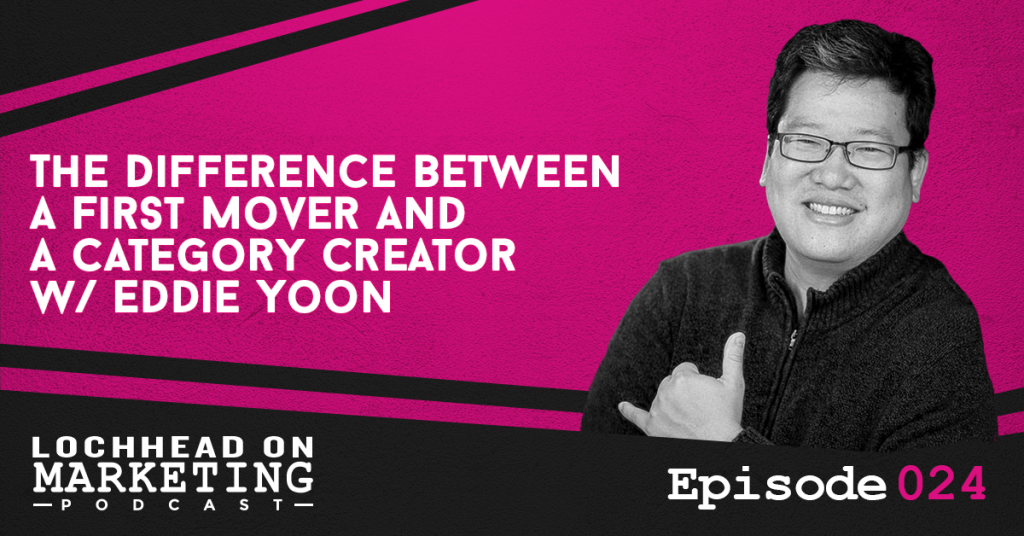
Podcast (lochheadonmarketing): Play in new window | Download (Duration: 36:02 — 49.6MB) | Embed
Subscribe: Apple Podcasts | Spotify | RSS | More
In this episode, Christopher tackles an article that appeared in Harvard Business Review which he co-wrote with Nicolas Cole and special guest for today, Eddie Yoon. Eddie is the author of Super Consumers and is considered a Category Design Guru of Fortune 500.
Today, we will discuss the thinking behind the article, specifically about the power of data flywheel and how high-growth companies used this to stay on top.
Frustration with Misinformation
Eddie discusses the reason behind writing this article with Christopher and Nicolas. Basically, it was sharing the same frustration about companies commensurate misinformation or misunderstanding on becoming the first-mover versus category creators.
“I just think, not only are they being misled, companies are in the relentless pursuit of being first. Let’s think about how to actually build a sustainable advantage at a category queen.” – Eddie Yoon
Furthermore, Eddie shares how he has observed this everywhere and that he is hopeful that people would take that energy that’s been misdirected to “being first”, towards building a flywheel.
Missionary vs. Mercenary
Eddie shares they did tons of analysis which basically asks “what’s your motivation for creating a category, are you a missionary or a mercenary?”
He says that mercenaries see the economics and they try to shortcut what is the fastest way to get to 76% to get the valuation. On the other hand, Missionaries are those who care about the product and the category being screwed up and would work towards improvement.
Eddie further discusses where radical differentiation would come in along with the transformational outcomes. He also says radical generosity is behind this.
Data Flywheel
Eddie shares the study they conducted for the article. Basically, he looked at 10 years worth of Fortune 100`fastest growing company list. He determined if he can identify fast-growing companies between those that were truly category creators. The markers he used were great product, service, company and data flywheel.
“If you are growing in a very specific way, if you have this flywheel, your valuation is meaningfully higher. You have 5x market cap for every dollar in revenue.” – Eddie Yoon
To hear more about The Difference Between a First Mover and a Category Creator and more relevant information from Eddie Yoon, download and listen to the episode.
Bio:
Eddie Yoon is the founder of EddieWouldGrow, LLC, a think tank and advisory firm on growth strategy.
Previously he was one of the senior partners at The Cambridge Group, a strategy consulting firm.
His work over the past two decades has driven over $8 billion dollars of annual incremental revenue.
In particular, 8 of his clients have doubled or tripled in revenue in less than 8 years.
Eddie is one of the world’s leading experts on finding and monetizing superconsumers to grow and create new categories.
He is the author of the book, Superconsumers: A Simple, Speedy and Sustainable Path to Superior Growth (Harvard Business School Press, 2016).
His book was named as one of the Best Business Books of 2017 by Strategy & Business.
He is also the author of over 100 articles, including “Make Your Best Customers Even Better” (Harvard Business Review magazine, March 2014) and “Why It Pays to Be a Category Creator” (Harvard Business Review magazine, March 2013).
Additionally, he has appeared on CNBC and MSNBC.
The Wall Street Journal, The Economist and Forbes has quotes several of his pieces.
Eddie has been a keynote speaker in the U.S., Canada, Kenya, Australia, New Zealand, Denmark, the UK and Japan.
Moreover, Eddie holds an AB in Political Science and Economics from the University of Chicago.
Having been born and raised in Hawaii, he went to the Punahou School in Honolulu.
Eddie lives in Chicago with his wife and three children.
Links:
Harvard Business Review: The Difference Between a First Mover and a Category Creator
We hope you enjoyed this episode of Lochhead on Marketing™! Christopher loves hearing from his listeners. Feel free to email him, connect on Facebook, Twitter, Instagram and subscribe on iTunes! You may also subscribe to his newsletter, The Difference, for some amazing content.
114 Think Like Amazon w/ John Rossman
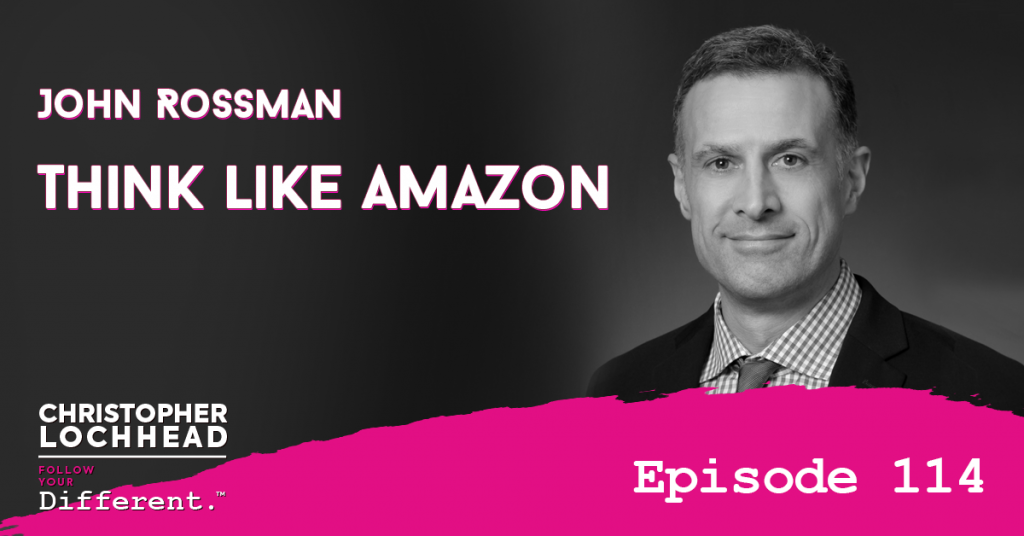
Podcast: Play in new window | Download (Duration: 56:44 — 78.2MB) | Embed
Subscribe: Apple Podcasts | Spotify | Pandora | RSS | More
For the second part of our two-part series on legendary category king companies, we are featuring John Rossman, author of “Think Like Amazon.”
We have a fun, insightful conversation about how Amazon became arguably the most innovative category king in the world and most importantly, how you can learn to think like Amazon in your career.
Digital vs. Traditional
Christopher probes John on his thoughts about the distinction between traditional businesses versus data-driven, digital ones. John shares that other than the technological aspect, he could relate digital businesses to athletic attributes such as speed and agility.
In detail, John said speed is about doing a repetitive motion, extremely well and efficiently. In business terms, that is considered as operational excellence. The second attribute, agility, is the ability to sense and make change happen.
“Part of being digital is about the eternal pursuit of becoming perfect. How do we reduce cycle times? Improve quality, reduce costs? Cut out little pieces of friction from both our customers and employees?” – John Rossman
Embracing New Niches
John cites Amazon’s business strategy in terms of embracing new niches. The other aspect of finding problems, then working on a solution, is the notion of working into the future. He defines the future as a “time and a place for unconstrained thinking.”
“Amazon’s answer to that, their philosophy or their technique is: start with the customer and work backward. ” – John Rossman
When teams are brainstorming, all of these constraints come to the table and they deliberately understand which parts of the solution they are. Afterward, they identify the right mindset, then the right tools and ultimately, the right approach in order to solve the problem.
Architecture is the Business Strategy
Citing some parts of the book, Think Like Amazon, Christopher asks John the idea behind the concept architecture is the business strategy.
“You have to plan forward on how you build things, because the constraints, the flexibility the adaptability on how you build your operations and your technology architecture—will either be a key enabler or key constraint in your ability in going forward.” – John Rossman
In the end, John shares that his whole goal is to give a business person, who is not technology architect, a set of tools and questions that they utilize to be a better partner with their technology expert
To hear more about how digital businesses like Amazon innovate across entire the entire value-chain and John Rossman’s thoughts on how to make wise bets on new business ideas, download and listen to the episode.
Bio:
John Rossman, Digital and Innovation Advisor
Mr. Rossman is an expert at digital business models, operations and organizing programs. He has led engagements on developing innovation processes, Internet of Things strategies, marketplace and API driven platform business models.
He is a sought after speaker on creating a culture of operational excellence and innovation.
Mr. Rossman has worked with clients across various industries, including retail, insurance, education, healthcare, consumer products, industrial products and transportation.
Mr. Rossman’s notable assignments include The Bill and Melinda Gates Foundation, Microsoft, Nordstrom and several of the world’s leading retail and insurance organizations.
Prior to Rossman Partners, John was a Managing Director at Alvarez and Marsal, a performance improvement consulting firm.
Prior to A&M, John was an executive at Amazon.com where he launched the Marketplace business and third party selling platform, and ran the merchant services business.
Links:
We hope you enjoyed this episode of Follow Your Different™! Christopher loves hearing from his listeners. Feel free to email him, connect on Facebook, Twitter, Instagram and subscribe on iTunes! Get amazing, different stories on business, marketing, and life. Subscribe to our newsletter The Difference.
113 Netflix’s Founding CEO Marc Randolph
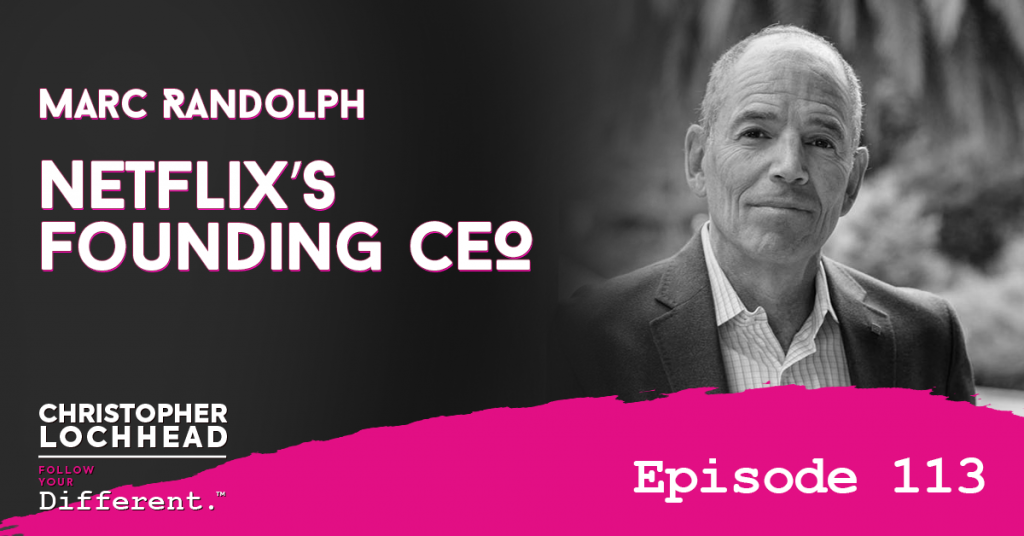
Podcast: Play in new window | Download (Duration: 59:52 — 55.1MB) | Embed
Subscribe: Apple Podcasts | Spotify | Pandora | RSS | More
Category King Marc Randolph, the founding CEO of Netflix, joins us today for a stunning conversation about business and life. He’s got a legendary bestseller out called That Will NEVER Work: The Birth of Netflix and the Amazing Life of an Idea, which he also talks about in this episode.
This is the first in a special two-part series about two of the most legendary category king companies in the world now Netflix and Amazon. Next episode is with John Rossman, author of “Think Like Amazon.”
Book: That Will Never Work
After nearly 16 years after he left Netflix, Marc Randolph talks about his book That Will Never Work. He candidly shares that all those years waiting for the right time to write a book helped him to gain perspective.
First, he says he is wiser business-wise as he worked with a lot of startup companies in the past 16 years. He says he can now identify patterns as they emerge and can safely say he can tell between what works and will not.
“The other cool thing that came out of waiting was, being able to look back and be honest about myself. To really say, ‘I don’t care how it’s perceived. I want this to be a real true portrayal of what it’s like in a startup.’” – Marc Randolph
Remembering Moments, Not Details
Marc also shares that he tried to get it right, but since he is writing about events that took place around 20 years ago, he shares how ridiculous it would be to remember every line and dialogue that he featured in the book.
He also shares he focused on remembering the moments, especially the mood of the conversations that he had. Christopher even remarked a portion of the book where Marc wrote: “This is a memoir, not a documentary. This is kind of how I remember things. I’m not trying to get it 100% right.”
Everything is Intermingled
Christopher chides with Marc on the part where he mentions that personal life intermingles with business life. Marc stressed the importance of devoting time for spouses and kids, as this is a realistic portrayal of a startup.
“I think part of being successful is having balance in your life. I preach about culture is not about what you say, it’s what you do. So I wanted to show how we did it, how do you really have balance in your life.” – Marc Randolph
To hear more about life and business lessons from Netflix Founding CEO Marc Randolph, download and listen to the episode.
Bio:
Marc Randolph is a veteran Silicon Valley entrepreneur, advisor, and investor. As co-founder and founding CEO of Netflix, he laid much of the groundwork for a service that’s grown to 150 million subscribers and fundamentally altered how the world experiences media.
He also served on the Netflix board of directors until retiring from the company in 2003.
Marc’s career as an entrepreneur spans four decades.
He’s founded or co-founded six other successful startups, mentored hundreds of early-stage entrepreneurs, and as an investor has helped seed dozens of successful tech ventures (and just as many unsuccessful ones).
Most recently, he co-founded analytics software company Looker Data Sciences, which was recently purchased by Google for $2.6 billion.
Outside of the tech and startup world, Marc sits on the boards of Chubbies Shorts, Augment Technologies, the environmental advocacy group 1% For The Planet, and the National Outdoor Leadership School (NOLS), which he’s been involved with for most of his life.
A resident of Santa Cruz, California, Marc travels and speaks all over the world, and still probably manages to go surfing more than you do.
Links:
We hope you enjoyed this episode of Follow Your Different™! Christopher loves hearing from his listeners. Feel free to email him, connect on Facebook, Twitter, Instagram and subscribe on iTunes! Get amazing, different stories on business, marketing, and life. Subscribe to our newsletter The Difference.

